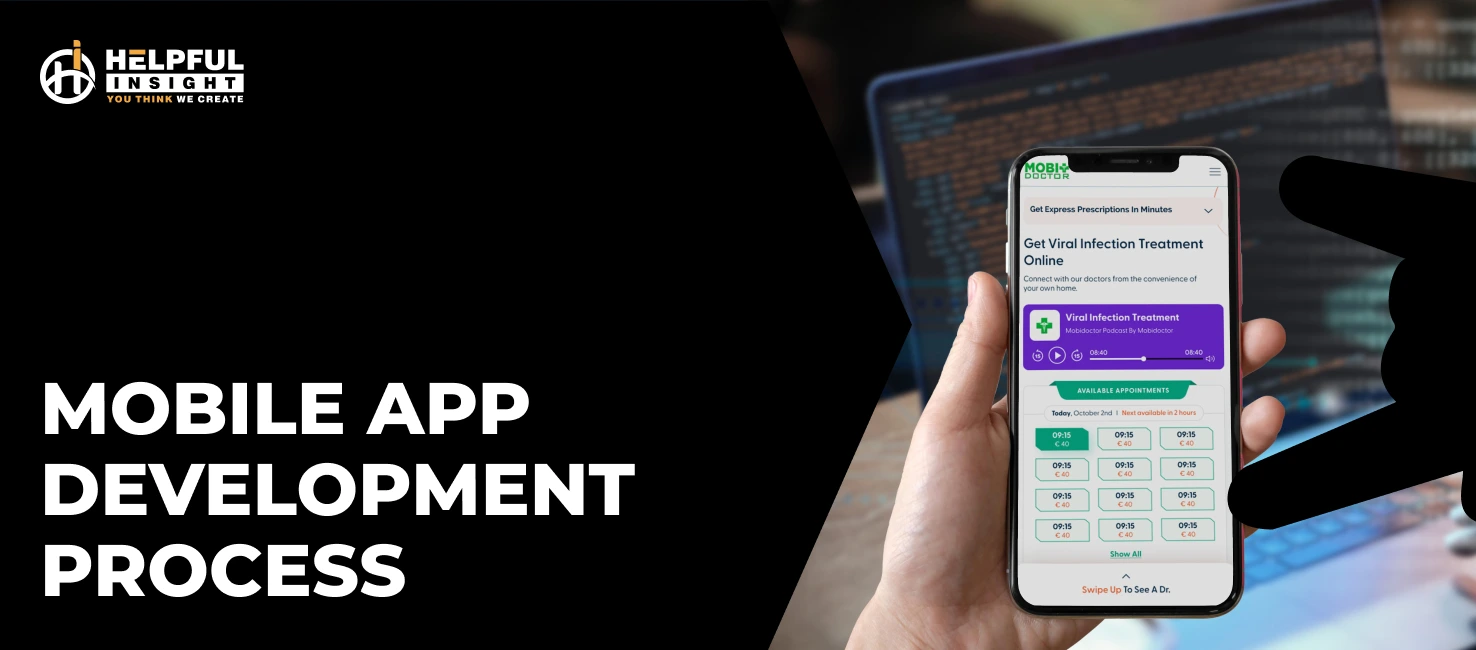Mobile application development has evolved a great deal in the past few years, and now it has become the most lucrative and compelling venture in the modern digital economy. The mobile app Industry has been influenced greatly by the latest and trending technologies, modifying smartphones with a range of advanced features and functionalities. The most noteworthy factor among this is that the mobile app development industry has transferred to a great extent since the days of ‘Doodle Jump’.
Mobile apps are the main ingredient needed to meet the wide range of needs and ever-growing demands. To meet the growing needs of a tech-advanced user base, mobile app development companies have to upgrade and refine their mobile app development process to a firm set of steps.
In this comprehensive guide to mobile app development, we will be exploring the vast world of mobile app development to find out the answer to the question ‘What is the process of developing a mobile app’ along with the essential factors associated with the development process. Along with trying to understand the app development approach we take at Helpful Insight, we will also examine a step-by-step roadmap and valuable insights for your App Dev project. Scroll down to get full in-depth expertise.
An Introduction to Mobile App Development
Mobile app development is a complex process of crafting software applications for handheld devices like smartphones, the process involves careful planning, designing, development, testing, and deployment of an app to execute various business operations. A typical mobile app relies on the network connection to access or interact with external computing resources. The responsibility of creating mobile-friendly apps is either taken by massive organizations with large technical workforces handling projects or by a single freelance app developer.
The mobile app development process is a complicated task with various factors to consider. Mobile app developers need to consider a wide range of factors like the size of the project, the complexity of features, the number of features they want to add, requirements specifications, how many changes the customer wants, the size and expertise of the app development team, project deadline, and more..
Even finding a skilled and professional mobile app developer to hire is a challenging task. A good way to sort out the best mobile app developer is to go for the one who works in popular operating system environments like iOS and Android and can often take into account Ui and UX principles when developing mobile applications.
Mobile App Development Statistics: Essential Statistics & Insights
Mobile app statistics offer valuable insights about user engagement, app performance, and growth opportunities. These statistics will give you a sneak peek of user interaction with your app, measure its popularity, and help you make informative decisions to boost user experience and drive growth. According to Statista, it is estimated by experts that by 2027, consumer spending on app stores will reach around $125 billion, driven by in-app purchases, subscriptions, and one-time transactions.
Beyond revenue generation, mobile apps offer businesses an opportunity to diversify income streams and establish a strong foothold in the rapidly evolving global app market. Therefore, investing in mobile apps is important for businesses to expand their reach around the globe, boost revenue, and diversify income streams. So, whether you are a top app developer or a leading mobile app development agency, understanding and leveraging these statistics is the secret to ensuring the long-term success of your app in the mobile app industry.
- By 2025, the app revenue market is expected to have grown to a value of USD 613 billion by 2025.
- Globally, users will spend $233 billion on premium apps, in-app purchases, and subscriptions through Google Play and Apple’s App Store by 2026. Compared to the $132 billion that consumers spent in 2021, this 77% increase is impressive.
- Total revenue of mobile apps is expected to grow at a CAGR of 9.27% from 2022-2026, with a value of 614.40 billion USD by 2026.
- Total revenue is expected to show an annual growth rate (CAGR 2022-2029) of 7.48%, resulting in a projected market volume of US$781.70bn by 2029.
(Sources: Statista, Sensor Tower)
Types of Application Development: Choosing the Right Fit for Your Business
Mobile applications are designed to cater to diverse user needs and technological capabilities. They can be categorized into six main types. Understanding these categories helps businesses choose the right type of app to align with their goals and audience needs. Let’s take a look at them:
Rapid application development
Rapid Application Development (RAD) focuses on speeding up the development process without compromising on quality, making it a more flexible method of app development. In this app development approach, mobile app developers can speed up their feedback, make multiple adjustments, and offer updates to existing apps without starting from scratch every time.
Database application development
Database application development deals with entering, centrally storing, and digging out information. As businesses expand, it has become tedious to manage data gathered from multiple sources, that’s where database apps help. Database app developers create these apps to help users define custom rules, relate data from various systems, release workflows specific to business, and allow user-based authorizations.
Custom application development
Custom app development is to design, develop, and deploy mobile apps tailored according to specific users to meet certain business requirements. This method has a narrow focus and is mostly opted by organizations wanting to address certain goals or business needs. Development agencies offering custom app development need to hire mobile app developers with extensive experience to offer such services.
Enterprise application development
Enterprise app development is a collaborative method of developing customized mobile apps for large corporations to meet their complex requirements for businesses. This type of approach helps automate certain functionalities and processes, letting users perform their tasks more efficiently and quickly.
Citizen application development
The procedure of developing mobile applications by non-professional app developers is often referred to as “citizen developers.” the world has witnessed an increase in the popularity of citizen app development in recent years, and the credit for it goes to low-code and no-code development tools that simplified the process for non-technical individuals to create simple apps.
Web application development
Websites that work similarly to mobile apps are called web apps. Users only need to download a web browser; no further apps are required. Web apps are the most affordable ($50,000–$250,000) and straightforward to create for all the app categories. Web apps have less market presence because they are not listed in app stores. On the other hand, web app development is simpler than apps listed on app stores.
Breaking Down the Most Effective Mobile App Development Approaches for 2025
There are four different types of approaches app development firms opt for in the app development process. Each of the strategies has advantages and disadvantages of its own. The mobile app development frameworks or methods are determined by numerous aspects and factors, including project requirements, team dynamics, or timelines. Let’s explore these key approaches in detail:
Native app development
The process of Native App Development entails creating applications specifically designed for a single mobile platform, either iOS or Android. App platform developers utilize platform-specific programming languages like Swift or Objective C for the iOS platform and JAVA or Kotlin or Android platform, software development kits, and development environments. Native mobile applications create tailored experiences for users by using advanced native tools, ensuring the convenience of each OS user. Moreover, Native apps can deliver better dependability, performance, and responsiveness, making them the perfect choice for mobile app developers.
Hybrid app development
Hybrid App Development is the process of creating classified apps by combining both web and native app solutions. In the type of mobile app development procedure, developers use web technologies like CSS and HTML. Hybrid mobile apps work on a single codebase that allows them to work on different types of platforms. In addition to having a shorter development lifetime than native apps, Hybrid Mobile Apps have access to native device functionalities through plugins. Conversely, hybrid apps provide a more cost-effective approach to app development and a quicker deployment time.
Cross-platform app development
Thanks to cross-platform app development, app developers can seamlessly create codes across platforms with only minor adjustments. Xamarin and React Native are two prime examples of technologies and frameworks developers use while creating scalable cross-platform apps that share a single codebase. While cross-platforms offer some performance benefits over hybrid ones, they might not be able to match the seamless integration and level of optimization that native apps provide.
Progressive web app development
Progressive Web Application Development is the creation process of web-based apps that offer a native app-like user experience but within the web browser. PWSs utilize technologies like CSS, HTML, and JavaScript to provide Cross-platform compatibility. Users can access PWAs without needing to download any final app from the App Store or Play Store. Progressive web applications can be put on the home screen of any handheld device like a smartphone without a standard browser. They are uniquely designed to be sensitive and connect on their own, which is their USP.
Also read: 45 Best Web App Ideas
Helpful Insight’s Structured Approach to Mobile App Development: Our Proven Steps
The process of developing a high-quality mobile application is a complex and challenging task. The development process involves several meticulous stages. So today, we are going to show you the roadmap of mobile app success through our proven mobile app development steps we follow at helpful insight, ensuring innovative and seamless development.
Being a leading provider of mobile app development in the US, we employ numerous steps and trending technologies in developing mobile apps. Here are the key stages of mobile app development, let’s dive into them:
#1. Pre-Scoping Your App: Setting the stage for Successful App Development
Pre-Scoping is the first and crucial step in the mobile development journey. It is important to set a strong foundation for your mobile app, leading to an informed decision-making process. In pre-scoping, we evaluate the app’s viability and define essential requirements. To comprehend the goal of the app and the needs of the market, this discovery stage of mobile app development starts with ideation and extensive market research. In their feasibility analysis, our app development team looks at budget and schedule estimates and identifies any technical issues.
#2. Securing Your App Concept with an NDA
An NDA is the next step following the pre-scoping phase. because protecting your app idea or intellectual property is our top priority. To secure the data security and privacy of information, we employ the signing and mailing of non-disclosure agreements, which assures our prospects that we will not exploit, misuse, or share their notion with other businesses. This non-disclosure agreement serves as a crucial legal document that safeguards your private information and resourceful software ideas.
#3. Crafting a Clear Project Strategy and Requirements
After a prospect joins our clientele, we begin with developing a detailed scope of work that aligns perfectly with their goals and vision. This phase of mobile app development entails laying out the purposes and ideals of the project. The main outputs, the technical specifications, and the development schedule include the time it will take to complete the process of development. In this stage, our development team will document all the project requirements and specifications including the features and functionalities you want to add.
This also involves the prototyping and wireframing stage, which lets you see how the app will look, in simple words, its interface and design. Aside from that, technical feasibility studies evaluate the project’s technical needs and confirm that the objectives of your mobile application are in tune with the available teck-stack. The estimated cost of the mobile app development process is also included in the SoW.
#4. Building an MVP: The heart of app creation
After crafting a robust project strategy and stating the requirements, it’s time to move onto the most crucial stage of app development, the development process. We strictly follow the Agile methodology to guarantee the development of scalable, high-performing mobile applications. This method guarantees a smooth and effective development cycle by encouraging constant cooperation between the teams of designers, developers, programmers, and quality assurance. All stakeholders must actively participate for Agile to be successful, as this allows for quicker iterations, better functionality, and a final product that is focused on the needs of the user.
#5. Comprehensive Quality Testing of Application
Rigorous testing is important to ensure the flawless performance of your app. It involves different types of testing, including functionality testing to ensure all integrated features work perfectly as planned, performance testing to optimize speed and responsiveness, compatibility testing to ensure it runs on various devices and platforms, and security testing to protect user data. Our mobile app development team ensures the app goes through every stage of testing to ensure speed, responsiveness, performance, and stability under different conditions.
#6. Successful launch of the app
Once your app has undergone sufficient testing, it is time for its official launch. The launching process of the app involves the release of the app in the App Store or Play Store, making it available for users. To ensure a successful launch of applications, our experts help you create a robust marketing strategy ad promotions like social media, content marketing, and paid advertising.
#7. Post-launch maintenance and support
Seek out helpful insight, your trusted app development partner for post-app launch maintenance and support. Our expert team stick with you until they have ensured that the millions of users the app was intended to reach have adopted it. We also provide updates to new features or technologies, ensure that marketing efforts are implemented to grow your user base, and offer continuous maintenance and support to address any issues that users may have reported.
Mobile app development cost estimates
The cost of developing a mobile application is determined by several significant factors. Excellent app development doesn’t require a large budget; if you are aware of these factors that determine costs, you can make the most cost-effective decisions and maximize your development. It will also help you to stay within your purchasing budget. Mobile app development costs typically fall between $25,000 and $150,000, but they can even surpass $300,000 for highly complicated, bespoke apps. The below table showcases the cost of developing mobile apps based on complicity.
| App Type | Average Timeline | Average Cost |
| Simple Apps | 2-3 months | $5000 to $50,000 |
| Medium Apps | 3-9 months | $50,000 to $120,000 |
| Highly Complex Apps | 10+ months | $120,000 to $130,000 |
Also read Mobile App Development Cost: A Complete Guide to get a detailed insight into the cost structure of mobile app development.
Kickstart Your App Development with Helpful Insight’s Expert Development Team
Navigating the complex world of app development can be overwhelming, but with Helpful Insight as your trusted mobile app development partner, success becomes seamless. Our skilled team meticulously handles each step of the process, ensuring precision, compliance, and efficiency. Our app development team comprises highly proficient developers experienced in Android, iOS, and cross-platform development. They utilize modern tools and technologies to deliver robust, feature-rich applications.
Whether you’re launching a new app or refining an existing one, we provide end-to-end solutions tailored to your vision. Partner with us and turn your app idea into reality with expert guidance at every stage. Partner with your app development specialists and experience seamless app development designed to maintain the stability, performance, and growth of your mobile app. Let’s innovate something exceptional with our development expertise!
FAQs
What does mobile app development entail?
The process of planning, creating, testing, and releasing applications for mobile devices is known as mobile app development. Planning, UI/UX design, development, testing, deployment, and maintenance are some of its phases. Developers employ a variety of technologies and frameworks, including web-based, hybrid, and native solutions, depending on the needs of the project.
How much time does it take to create a mobile application?
The complexity of the app, its features, and the team’s experience all affect how long it takes to design a mobile application. Generally speaking:
- Basic functionality in apps takes two to four months to develop.
- It takes four to six months for moderate apps (custom user interface, third-party integrations).
- It takes more than six months to develop complex apps (AI, real-time data, custom APIs).
Should we choose an iOS or Android platform for app development?
The following factors determine whether to use iOS or Android:
- Target market: Android is more widely used worldwide, although iOS is the market leader in Western countries.
- Time and money: Because there are fewer device differences, iOS apps are often developed more quickly.
- Revenue model: While Android apps profit from a wider user base, iOS consumers often spend more on apps.
Think about cross-platform development with React Native or Flutter for a broader audience.
How can I ensure the safety of my app?
To protect your app and user data, follow these best practices:
- Use strong encryption for data transmission and storage.
- Secure APIs to prevent unauthorized access.
- Implement authentication protocols (OAuth, biometrics, two-factor authentication).
- Conduct regular security audits and penetration testing.
- Follow app store guidelines to prevent security vulnerabilities





